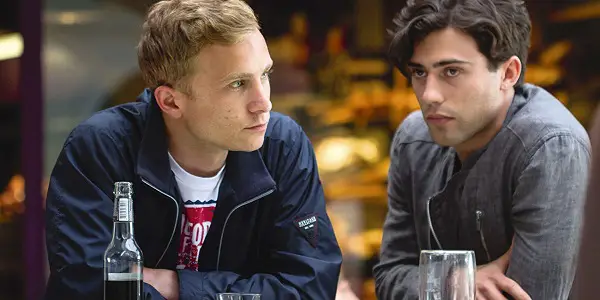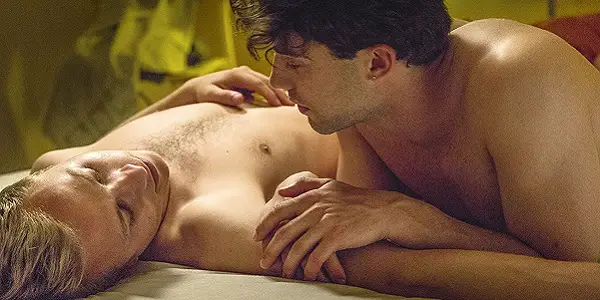MARIO: A Powerful Kick To The Heart

Lee Jutton has directed short films starring a killer toaster,…
A Swiss drama set within the world of professional soccer, Mario explores the forbidden romance between two young strikers on the same team and their attempts to keep their relationship a secret from everyone around them. Co-written and directed by Marcel Gisler, the film is a heart-wrenching portrayal of the pain that is inevitable when one does not feel free to be one’s authentic self.
Magic On and Off the Field
Mario (rising Swiss star Max Hubacher, who made a splash earlier this year starring in Robert Schwentke’s The Captain) is a promising striker for the Young Boys under-21s team in Bern. (Yes, it’s a real team). The kind of driven young guy who wakes up early to run extra laps and perform extra drills on his own, Mario hopes that this will be the year he secures a contract from the senior Young Boys squad. But a new challenge appears in the locker room in the form of Leon (Aaron Altaras), a striker imported from Germany who everyone expects to be Mario’s big rival. However, instead of battling each other, the two discover a remarkable chemistry on and off the pitch.

Mario and Leon match up well on the field, passing the ball back and forth unselfishly to create and score goals with ease. When it is suggested that Mario finally move out of his parents’ house and into a player apartment with Leon, both young men accept the proposal and quickly bond over beer and video games. That is, until one day Leon leans in for a kiss. At first, Mario is uncomfortable, but soon, he succumbs to his undeniable attraction to Leon, and the two fall into a fast and furious love affair.
While Mario has never really had a girlfriend or a boyfriend, Leon has always known he was gay and is comfortable with his sexuality despite knowing it remains a taboo in professional soccer. However, when rumors begin to spread that Mario and Leon are more than just teammates and roommates, Mario grows frightened that everything he has worked for his entire life will fall apart just because of who he happened to fall in love with.
The Sharp Pain of Reality
Thanks in large part to the sizzling chemistry between the film’s two handsome young stars, Mario is an intense tale of first love that packs an emotional wallop on par with last year’s Call Me By Your Name. Despite what many around them may think, Mario and Leon’s relationship is so much more than two hormone-crazed young men fooling around in their spare time; the two of them connect physically and emotionally on a level that neither of them ever has with another person before. Gisler’s deft direction ensures that the intimate moments between them in the film are steamy without being exploitative. It is impossible not to become deeply invested in their burgeoning romance, especially as they encounter seemingly insurmountable obstacles to their happiness.

From being blackmailed by a teammate who discovers their secret to being encouraged to step out with fake girlfriends in order to put people on the wrong scent, Mario and Leon are unable to slow down and explore their love for each other in a way available to any other young couple. Mario is forced to choose between following his heart and continuing his relationship with Leon or following his dream of becoming a professional soccer player and remaining in the closet, and the way his story unfolds is all the more painful because of how realistic it is.
There are still no out professional soccer players in the leading European leagues of men’s soccer, and in Mario, one is able to see why players are still afraid to break this decidedly archaic taboo. Indeed, as someone who watches a lot of soccer, I can easily say that the portrayal of European soccer in Mario – from the sport itself to the business and the culture – is just as grounded in the real world as the love story at its center. It helps that the film utilizes the names, branding, and locations of real professional soccer teams such as Young Boys and St. Pauli, providing the story with yet another layer of authenticity.

In addition to poignant lead performances from Hubacher as Mario and Altaras as Leon, the film also boasts a well-rounded supporting cast that includes Jessy Moravec as Mario’s childhood best friend and eventual fake girlfriend; Jürg Plüss as Mario’s overbearing father, who wants Mario to have the glittering career he never had; Doro Müggler as Mario’s mother, who values her son’s happiness above all else; and Andreas Matti as Mario’s agent, who attempts to guide his young client through the veritable minefield that is being a closeted professional soccer player.
Yet despite such well-meaning suggestions as speaking with a sports psychologist or finding a discreet way to meet up with men, it’s clear that balancing emotional satisfaction with professional satisfaction remains impossible for someone like Mario. What makes this realization even more heartbreaking is knowing that this remains true for soccer players in the real world as well. With this in mind, the film’s final shot of its titular hero – like those closing moments with Elio in Call Me By Your Name – will haunt you for days.
Mario: Conclusion
Mario tackles the stigma of being a gay man in professional soccer with remarkable realism and heart. What could have been excessively melodramatic or exploitative is instead, in the capable hands of Gisler, one of the most engaging romantic dramas I have seen in quite some time.
What do you think? Does Mario sound like a realistic portrayal of homosexuality in professional soccer? Share your thoughts in the comments below!
Mario is available on video on demand in the U.S. on October 30, 2018. You can find more international release dates here.
Does content like this matter to you?
Become a Member and support film journalism. Unlock access to all of Film Inquiry`s great articles. Join a community of like-minded readers who are passionate about cinema - get access to our private members Network, give back to independent filmmakers, and more.
Lee Jutton has directed short films starring a killer toaster, a killer Christmas tree, and a not-killer leopard. Her writing has appeared in publications such as Film School Rejects, Bitch: A Feminist Response to Pop Culture, Bitch Flicks, TV Fanatic, and Just Press Play. When not watching, making, or writing about films, she can usually be found on Twitter obsessing over soccer, BTS, and her cat.











